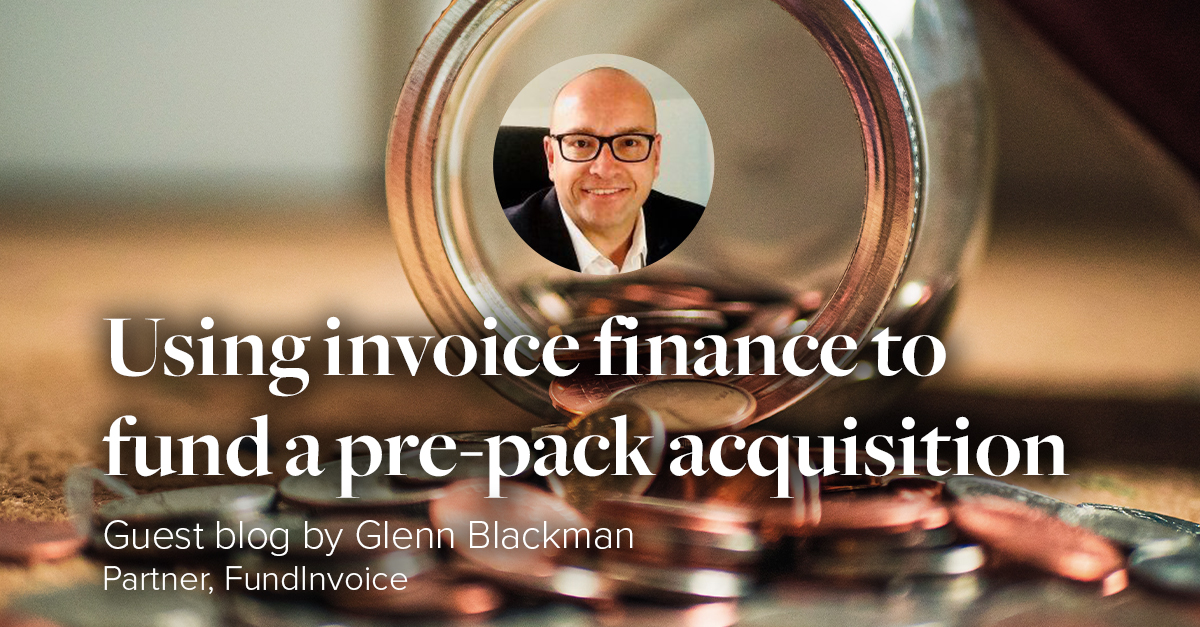22nd March 2022
Using invoice finance to fund a pre-pack acquisition

Over the last few years, trading has been difficult for UK businesses. They have had to contend with the pandemic, supply chain problems and rising inflation driving up the cost of raw materials. These circumstances have placed companies under financial pressure, and we are starting to see businesses seeking additional funding beyond any government support given through the pandemic. In some cases, these financial difficulties are becoming overwhelming.
Insolvencies on the rise
Commentary from the UK Insolvency Service states that corporate insolvency rates have been on the rise. After seasonal adjustment, the number of company insolvencies in Q3 2021 was 17% higher than the previous quarter and 43% higher than the same quarter in 2020. A statement from R3, the UK’s trade association for insolvency and restructuring professionals, suggests that increased insolvencies may be due to creditors starting to take action over unpaid debt, having been legally prevented from doing so since the start of the pandemic.
Anyone that is facing insolvency should contact a licenced insolvency practitioner as there can be stiff penalties for continuing to trade whilst insolvent. Directors often feel this is the end of the line once their business enters insolvency proceedings. However, there can be light at the end of the tunnel. With the right support, it may even be possible to relaunch a restructured version of the business.
Administration and pre-packs
Company Administration is an insolvency process whereby the running of an insolvent company is taken over by a firm of licenced insolvency practitioners (also called an IP). This court approved process gives the company’s assets a degree of protection from creditors with the aim of improving the returns delivered to the company’s creditors overall.
As part of the process of appointing Administrators, a pre-pack may be able to be negotiated with the IP. A pre-pack is an agreement with the Administrators for the sale of a failed business, or its assets to another party. This sale may be to a third party or sometimes, the directors of the failed business.
The advantage to the creditors is that they benefit from the purchase price paid by the party buying the assets. At the same time, the party buying the assets gets the opportunity to restructure the existing business without the burden of its existing liabilities. The burden of legacy debt can dramatically affect the viability of a business.
Financing A Pre-Pack
Often, a critical issue is being able to raise the finance to fund the pre-pack. The purchasers may have their own sources of funding, but some will need external financial support. The purchase price, to achieve fair value for the creditors, can be significant. Furthermore, existing directors may be concerned that they will no longer be eligible for finance due to their association with a failed business. This is not always the case as funders such as Optimum Finance try to take a sympathetic view in such situations.
One way of raising the finance for a pre-pack acquisition is by using the book debts of the target business to support an invoice finance facility. The steps involved are explained in our Guide To Pre-Pack Finance. Sometimes, people are unaware of this possibility that can be structured with support from an invoice finance company. Invoice financing releases the cash tied up in outstanding unpaid sales invoices. If the target company has a significant sales ledger, this can be used to unlock a large lump sum that may help the buyers meet the sale price required by the Administrators. Get an instant estimate of the funding you could access with the Optimum Finance funding calculator.
The outlook
As the pressures on UK companies increase, we are expecting the number of struggling companies to rise. Hence, the opportunity to restructure in the way described above may be an attractive option for company directors, whilst benefiting their existing creditors. Whilst not all cases will be eligible, we work with funding partners such as Optimum Finance to support struggling businesses wherever possible.
By Glenn Blackman Partner at FundInvoice LLP